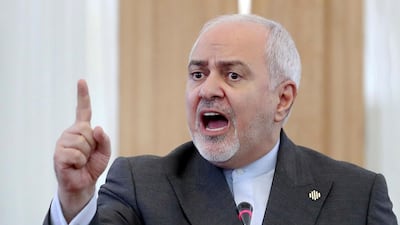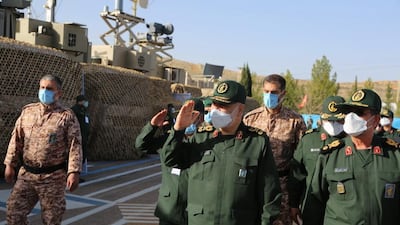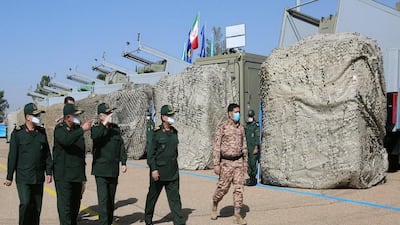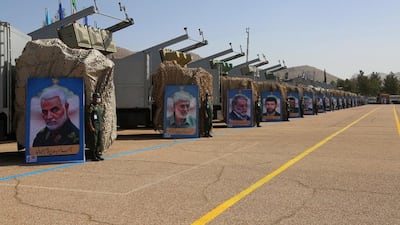Top Iranian commander Qassem Soleimani worked to undermine Iran's diplomatic efforts, the country's foreign minister and lead nuclear negotiator said in leaked audio that offered a rare view of the inner workings and factional disputes of the regime.
Javad Zarif was in charge of Iran’sdiplomatic engagement with international powers that led to the 2015 nuclear deal to remove sanctions in exchange for curbs on uranium enrichment.
In three hours of leaked audio, he candidly paints a picture of Iran as a country where "the military field rules" and said the world view of the country's leadership was "based on a polarised cold war".
The leaked interview took place in March with economist Saeed Leylaz as part of an oral history project
Mr Zarif openly talked about Iran's foreign policy over the last 40 years, focusing largely on the last 10. Over the last ten years Mr Zarif points out, the government seems to have lost touch with its origins.
Mr Zarif – himself a former revolutionary in his youth – had been at the forefront of the creation of the Islamic republic.
He says that the country has lost touch, and has focused solely on its military might.
"The strength of this government is derived from the people and we must not forget that. Our strength doesn’t come from our missile capabilities," he said.
Rivalry with Ahmadinejad
Talking about his work through the years Mr Zarif openly discussed the damage that was done to Iran's standing on the global stage during the rule of President of Mahmoud Ahmadinejad and his famously inflammatory rhetoric.
Mr Zarif's chief complaint and frustrations through the three hour interview however, were focused on the incredible power of the military, specifically the Quds force.
He said a minority at the top had an "interest in highlighting security so that their roles can be outstanding" and confirmed what many analysts long suspected – that Iran's civilian leaders and diplomats were beholden to the country's supreme leader or its Islamic Revolutionary Guard Corps.
“I have sacrificed diplomacy for the military field rather than the field servicing diplomacy,” Mr Zarif said.
“Many diplomatic prices that we paid were because the [military] field was a priority.”
Mr Zarif said he was recently “forcefully rebuked” by Iran's supreme leader Ayatollah Ali Khamenei for not sticking to the official line and saying that Iran would work with the US to return to the 2015 deal.
Iran is currently in the midst of talks with the US and Europe in an effort to return to the 2015 deal. Mr Zarif warned in his interview that the next few months of talks would be critical because, "in six months the world will be a different place."
Hardliners in the country have been vocal in their opposition to any other talks with the US, which Mr Zarif says is because they don't understand that time is of the essence and the world does not stop moving forward.
Mr Zarif said Soleimani, who was killed in a US air strike near Baghdad airport in January 2020, used to direct his negotiations with foreign parties and worked with Russia to try to derail the 2015 nuclear deal.
Nuclear deal warning
The audio leak came hours before Mr Zarif travelled to Iraq on Monday to meet officials and visit a memorial to Soleimani. The leak also came just hours before the news that Mr Zarif had sent a letter to Ayatollah Khamenei requesting that harsh critics of nuclear deal be contained, and pressure on the negotiating team be halted.
"Almost every time I went for talks, it was Martyr Soleimani who said: 'I want you to get this advantage, this point.' He said: 'When you go to talk to [Russian Foreign Minister Sergey] Lavrov, get one, two, three, four.' If I had said don't use, for instance, Iran Air [civilian] planes on the Tehran-Syria route [for military purposes], he would not have accepted," Mr Zarif said.
Soleimani led the IRGC's Quds Force and was a hugely influential figure in the country, running a network of proxies from Beirut to Sanaa.
In the recordings, Mr Zarif said Soleimani worked with Russia to "demolish our achievement" on the nuclear deal because he said it was not in Moscow's favour for Iran to build relations with the West.
The audio was first reported by Iran International, a Saudi-funded media outlet in the UK that is critical of the regime in Tehran.
The National has since listened to the recording.
Iran's Foreign Ministry said the audio was taken "out of context" and that the full seven hours of audio could be published if authorities permitted it. On the audio recording of the interview the foreign minister can repeatedly be heard saying that his comments should not be published.
Ministry spokesman Saeed Khatibzadeh said the release was illegal and selectively edited.
The release of the comments set off a firestorm within Iran, leading for a number of parliamentary members to call for Mr Zarif's resignation.
Government officials in Iran typically are careful with any criticism of the regime, particularly criticism of the military.
The country is just a few months from an election and in the midst of talks with the US over the nuclear deal, creating a highly charged and factionalised political atmosphere. Mr Zarif has been facing a barrage of attacks on him including on a TV series titled 'Gando,' that has critcisised the foreign ministry and any effort to engage with the West.
Back in February another set of recordings of Mr Zarif were leaked, where the foreign minister was heard saying the government knew the truth about the Ukrainian airliner that was shot down and kept it hidden for three days.
Electioneering
Mr Zarif was suggested as a possible candidate for Iran's June 18 presidential election but now faces demands to resign from hardliners.
In another sign of the intensifying power struggle within Iran's domestic politics, hardline parliamentary members earlier this month filed charges against President Rouhani accusing the reformist president and his administration of ignoring the Islamic Revolution's goals and implementing pro-Western policies.
The New York Times reported that former vice president Mohammad Ali Abtahi said the leak of Mr Zarif's comments was "tantamount to Israel stealing the nuclear documents" from Iran.
He also said he clashed with Soleimani over Iran's activities in Syria, where Iranian ground forces were sent without his knowledge, for allowing Russian warplanes to use Iranian airspace to launch attacks on Syria and for co-operation to move military equipment using government owened Iran Air planes.
Colleagues at war
But Mr Zarif did not paint a singularly adversarial relationship between him and Soleimani.
Mr Zarif talked about his close co-operation with the Quds Force commander in the lead up to the Afghanistan and Iraq invasions. He said that he and Soleimani felt that they had a duty to work together even if the relationship was unbalanced.
He said the killing of Soleimani in Iraq was more devastating to Tehran's plans than if Washington wiped out a whole city.
In the audio, Mr Zarif said he had no prior knowledge of the response to Soleimani’s killing when Iran fired dozens of missiles at US forces in Iraq.
Mr Zarif said that Washington knew about the attack before he did and that this was not uncommon, even if it was embarrassing.
The IRGC gave a warning to Adel Abdul Mahdi, Iraqi prime minister at the time, who alerted the US.
Mr Zarif also said the IRGC knew straight away that it shot down a Ukrainian passenger jet in 2020, killing all 176 passengers and crew, shortly after shelling US forces in Iraq.
He said that after the plane was shot down, he attended a security council meeting with top military figures and demanded an explanation. He said he was rebuked and told to tweet that reports the IRGC shot the aircraft down were untrue.
“I said: ‘If it was hit by a missile, tell us so we can see how we can resolve it,’” Mr Zarif said. “God is my witness, the way they reacted to me is as if I had denied the existence of God.”
















